Opinions & Interviews
Belarus determined to preserve Holocaust memory

MINSK, 22 October (BelTA) – A rally took place in the memorial complex Pit on 22 October to honor the memory of prisoners of the Minsk ghetto, which was eliminated 75 years ago, BelTA has learned.
During the rally Belarusian Minister of Foreign Affairs Vladimir Makei said: “The memory of the Minsk ghetto tragedy fills our hearts with sorrow. We must counteract any manifestations of xenophobia and racism. We must resist any manifestations of ethnic or religious hatred. Today everything is done in Belarus to preserve the memory about the Holocaust victims, to guarantee that every person stands equal before the law regardless of their race, the color of their skin, national or ethnic origins. Belarus supports countries, international organizations, and the Jewish community as they work to immortalize the memory of World War Two victims and the deeds committed by veterans to save the world from the brown plague.”
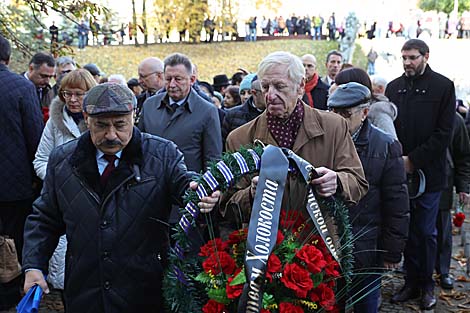 Vladimir Makei went on saying that descendants should not forget the tragedy of the Minsk ghetto where not only USSR citizens were slaughtered but also citizens of Austria, Poland, Czechia, and other European countries. During the years Belarus was occupied by the Nazi troops, the country went through all the horrors of the Hitler-inspired genocide. Over 260 death camps and mass slaughter sites were created in the Belarusian land back then, including over 70 Jewish ghettos. “Today the Pit memorial has gathered all the indifferent people in order to recall the tragic events, which happened 75 years ago. As we stand in the comfortable center of a peaceful city, we can hardly imagine that dozens of people were murdered here. It is the ghetto prisoners that the Nazi practiced their inhumane killing methods on, something, which was later named the Holocaust,” said Vladimir Makei.
Vladimir Makei went on saying that descendants should not forget the tragedy of the Minsk ghetto where not only USSR citizens were slaughtered but also citizens of Austria, Poland, Czechia, and other European countries. During the years Belarus was occupied by the Nazi troops, the country went through all the horrors of the Hitler-inspired genocide. Over 260 death camps and mass slaughter sites were created in the Belarusian land back then, including over 70 Jewish ghettos. “Today the Pit memorial has gathered all the indifferent people in order to recall the tragic events, which happened 75 years ago. As we stand in the comfortable center of a peaceful city, we can hardly imagine that dozens of people were murdered here. It is the ghetto prisoners that the Nazi practiced their inhumane killing methods on, something, which was later named the Holocaust,” said Vladimir Makei.
Vladimir Makei stressed that young people should be inoculated with values and culture, which will help them resist evil and intolerance. Vladimir Makei thanked the former ghetto prisoners for their courage and tenacity.
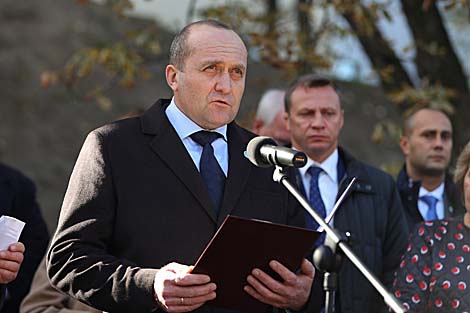 Deputy Head of the Belarus President Administration Vladimir Zhevnyak read out the Belarus president’s address to participants of the events held to commemorate the 75th anniversary since the Minsk ghetto was eliminated. Israeli Minister of Aliyah and Integration Sofa Landver made a speech during the rally. Executive Vice President of the European Jewish Congress Raya Kalenova, Ambassador of Germany to Belarus Peter
Deputy Head of the Belarus President Administration Vladimir Zhevnyak read out the Belarus president’s address to participants of the events held to commemorate the 75th anniversary since the Minsk ghetto was eliminated. Israeli Minister of Aliyah and Integration Sofa Landver made a speech during the rally. Executive Vice President of the European Jewish Congress Raya Kalenova, Ambassador of Germany to Belarus Peter
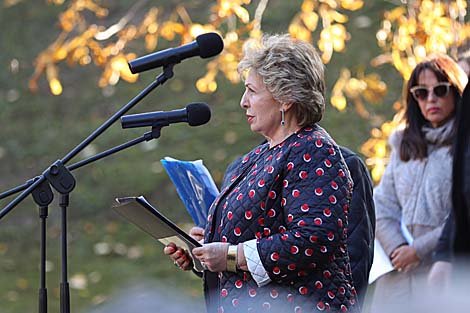 On behalf of the government and the people of Israel Sofa Landver thanked Belarus for preserving the memory about the Holocaust victims. “Both of our nations – Belarusians and Jews – have felt the full degree of blood-poisoning hatred and horrendous mass slaughter,” she said.
On behalf of the government and the people of Israel Sofa Landver thanked Belarus for preserving the memory about the Holocaust victims. “Both of our nations – Belarusians and Jews – have felt the full degree of blood-poisoning hatred and horrendous mass slaughter,” she said.
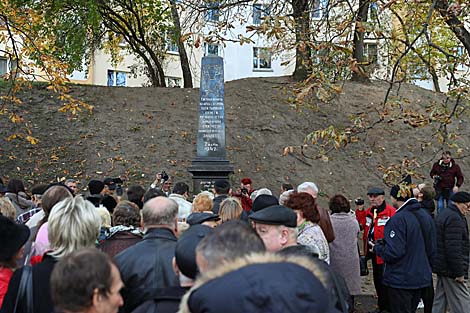 Raya Kalenova added that although a third of the Jewish population of the planet was destroyed, the Nazi failed to accomplish their goal. “We were lucky. We – children and grandchildren of those, who have survived the Holocaust – have gathered here today. We undertake to do everything possible to prevent another catastrophe like that. Today we mourn and honor the memory of those killed in Minsk but we also remember the mass slaughter in other ghettos of the country. Not only Jews suffered here, but Belarusians of all religions, too. Areas of mass slaughter, ‘fields of death’ were more frequent in Belarus than in any other European place, entire villages were razed to the ground,” she said.
Raya Kalenova added that although a third of the Jewish population of the planet was destroyed, the Nazi failed to accomplish their goal. “We were lucky. We – children and grandchildren of those, who have survived the Holocaust – have gathered here today. We undertake to do everything possible to prevent another catastrophe like that. Today we mourn and honor the memory of those killed in Minsk but we also remember the mass slaughter in other ghettos of the country. Not only Jews suffered here, but Belarusians of all religions, too. Areas of mass slaughter, ‘fields of death’ were more frequent in Belarus than in any other European place, entire villages were razed to the ground,” she said.
Peter
Dettmar also noted that memory of the Holocaust cannot and should not be forgotten. “It is a dreadful crime. From these dark pages of history we should learn the lessons today’s world and joint peaceful future across the globe need. We, Germans, understand the responsibility we bear for what has happened and how important it is to say ‘Never again!’ Our job is to pass the experience of the dreadful past onto the future generations as a warning. Our job is to stand against all those, who ignore it,” he noted.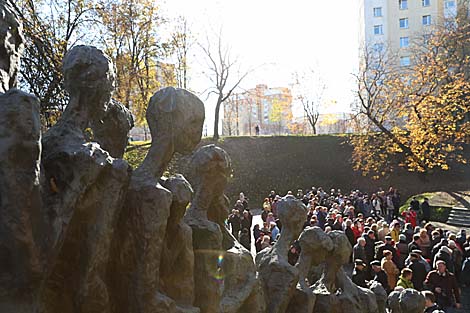 The Pit memorial is located in the area of Melnikaite Street and Zaslavskaya Street in Minsk. It has been created to honor victims of the Holocaust. The Nazi shot about 5,000 Minsk ghetto prisoners at the site on 2 March 1942. An obelisk was erected at the site after the war. The text on the obelisk was written in Yiddish by the poet Khaim Maltinsky. It was the first monument to Holocaust victims with an inscription in Yiddish in the USSR. A bronze sculpture composition The Last Way became part of the memorial in 2000. It depicts a group of doomed prisoners climbing down to the bottom of the pit. It took eight years to create the monument. All the work was done manually. A line of trees in honor of the Righteous Among the Nations was planted near the memorial in the 1990s.
The Pit memorial is located in the area of Melnikaite Street and Zaslavskaya Street in Minsk. It has been created to honor victims of the Holocaust. The Nazi shot about 5,000 Minsk ghetto prisoners at the site on 2 March 1942. An obelisk was erected at the site after the war. The text on the obelisk was written in Yiddish by the poet Khaim Maltinsky. It was the first monument to Holocaust victims with an inscription in Yiddish in the USSR. A bronze sculpture composition The Last Way became part of the memorial in 2000. It depicts a group of doomed prisoners climbing down to the bottom of the pit. It took eight years to create the monument. All the work was done manually. A line of trees in honor of the Righteous Among the Nations was planted near the memorial in the 1990s.
The Minsk ghetto was one of the largest death camps for Jews in Europe. By the end of October 1943 the Nazi had killed over 100,000 people there.
Belarus is now home to 79 former Minsk ghetto prisoners, 54 of them live in Minsk.







 print version
print version make home page
make home page add to bookmarks
add to bookmarks

